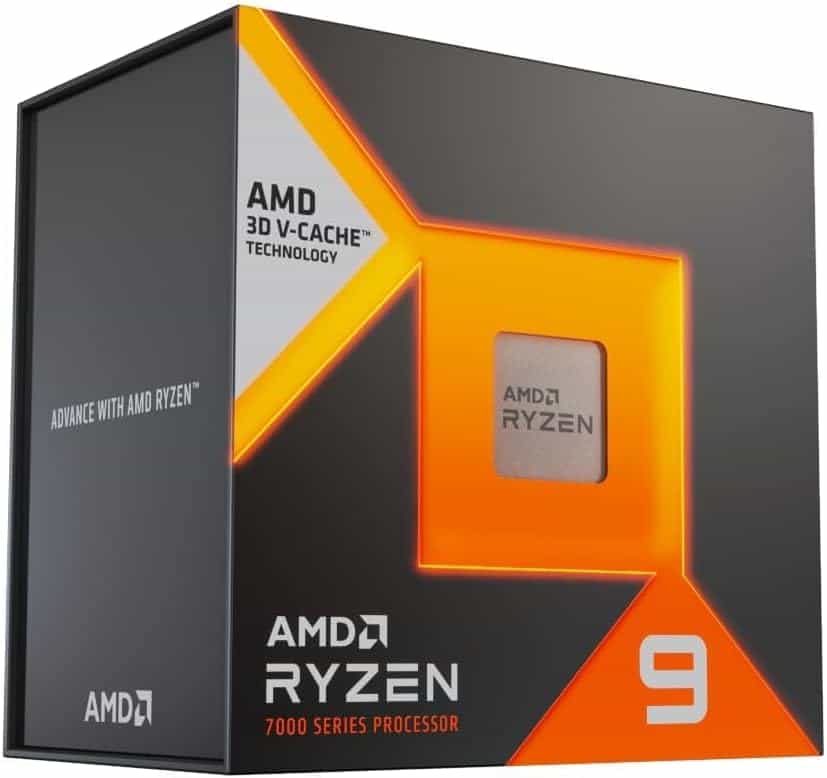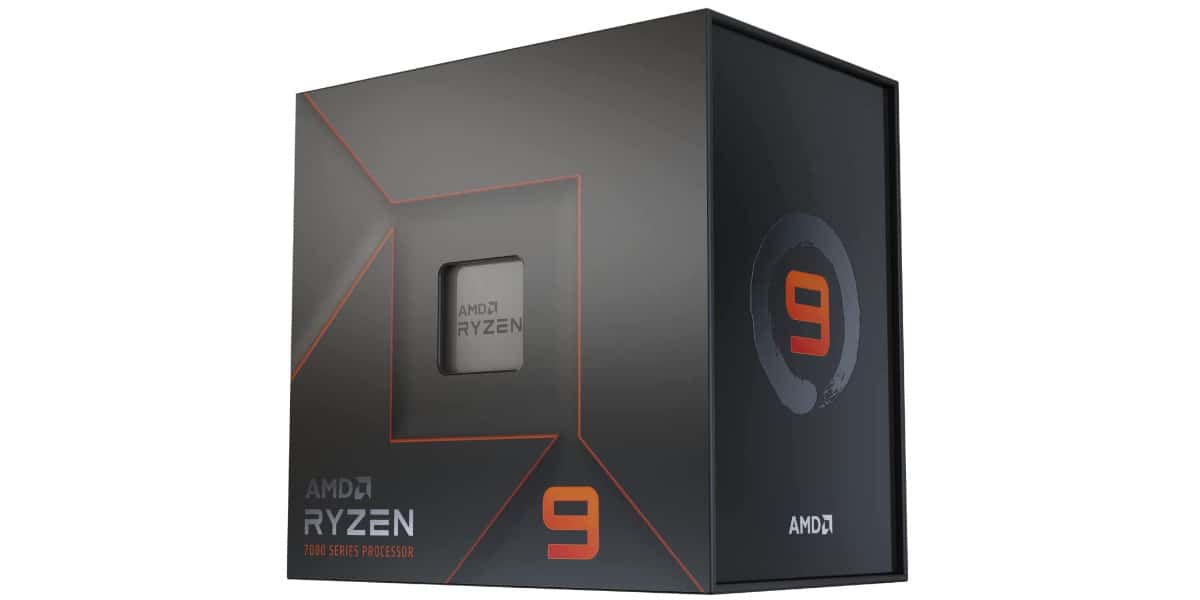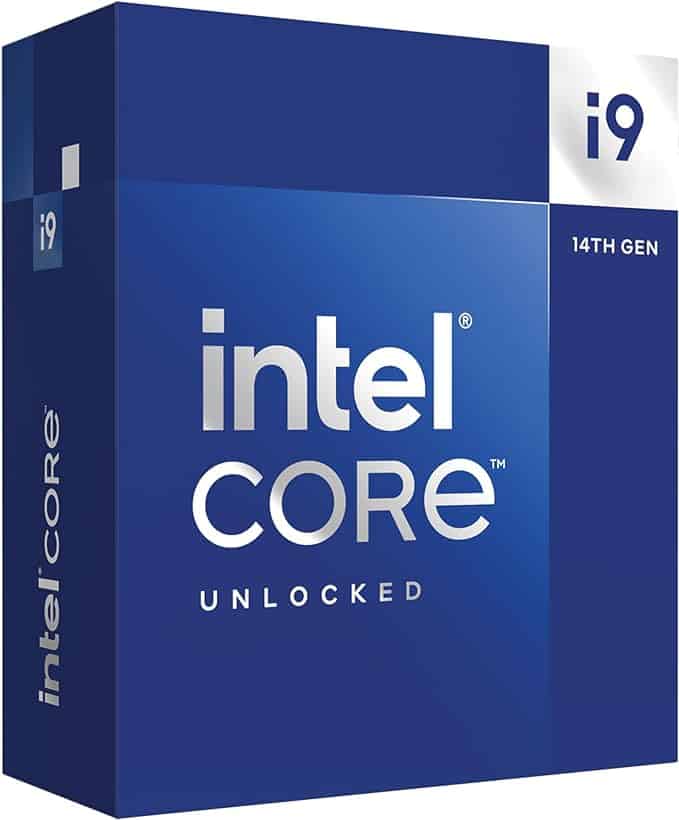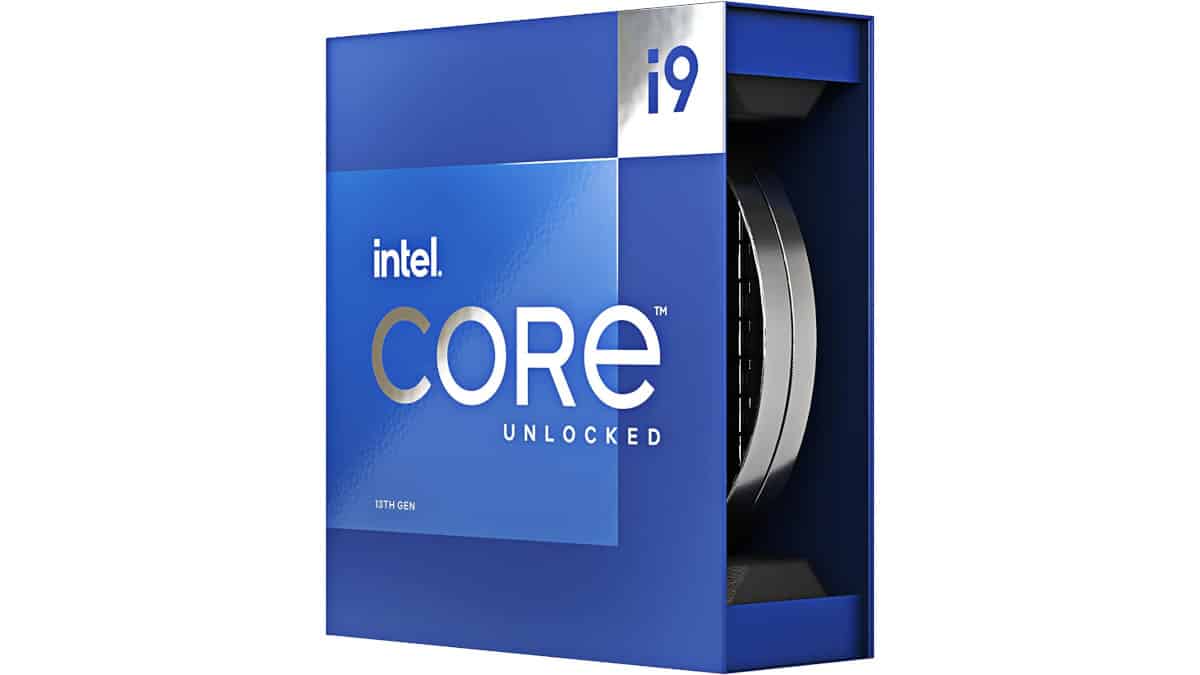Ryzen 9 9900X vs Ryzen 9 7950X: can the new gen bring enough uplift?

Table of Contents
For the next release on the supposedly long-lasting AM5 platform, we are getting the 9000 series release. With an expected uplift in performance and improvements in general, there’s a lot to look forward to. In this case, we see how much of an improvement we might see from it as we compare the 9900X vs 7950X to find the differences AMD is bringing to the table with some of the best CPUs on the market.
These are both on the high end of the AM5 platform, but still not quite on the same level and on differing generations. That might make it a bit more interesting to look at. So let’s see what that changes.
Prime Day is finally here! Find all the biggest tech and PC deals below.
- Sapphire 11348-03-20G Pulse AMD Radeon™ RX 9070 XT Was $779 Now $739
- AMD Ryzen 7 7800X3D 8-Core, 16-Thread Desktop Processor Was $449 Now $341
- ASUS RTX™ 5060 OC Edition Graphics Card Was $379 Now $339
- LG 77-Inch Class OLED evo AI 4K C5 Series Smart TV Was $3,696 Now $2,796
- Intel® Core™ i7-14700K New Gaming Desktop Was $320.99 Now $274
- Lexar 2TB NM1090 w/HeatSink SSD PCIe Gen5x4 NVMe M.2 Was $281.97 Now $214.98
- Apple Watch Series 10 GPS + Cellular 42mm case Smartwatch Was $499.99 Now $379.99
- ASUS ROG Strix G16 (2025) 16" FHD, RTX 5060 gaming laptop Was $1,499.99 Now $1,274.99
- Apple iPad mini (A17 Pro): Apple Intelligence Was $499.99 Now $379.99
*Prices and savings subject to change. Click through to get the current prices.
AMD Ryzen 9 9900X
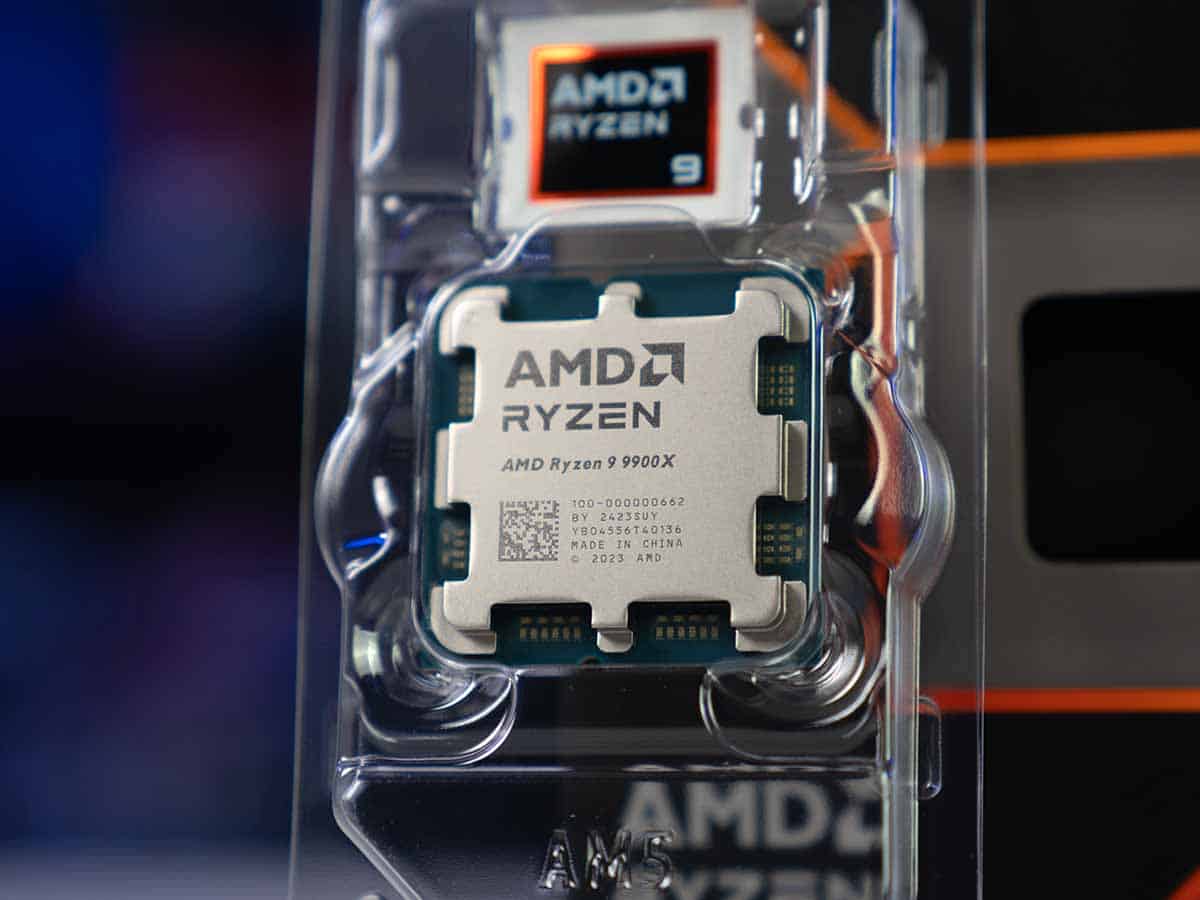
Cores
12
Threads
24
Boost clock speed
5.6 GHz
Base clock speed
4.4 GHz
L3 Cache
64 MB
TDP
120 W
Platform
AMD Socket AM5
Shop on Amazon
CHECK PRICEAMD Ryzen 9 7950X
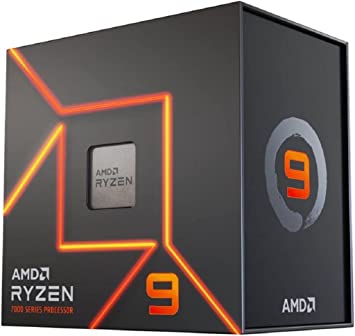
Cores
16
Threads
32
Boost clock speed
5.7 GHz
Base clock speed
4.5 GHz
L3 Cache
64 MB
TDP
170W
Platform
AMD Socket AM5
Shop on Amazon
CHECK PRICESpecifications
Starting off we look at what makes these two processors tick. These will be the core reasons for the differences we get from the CPUs so it’s a good place to start.
| Specification | Ryzen 9 9900X | Ryzen 9 7950X |
|---|---|---|
| Platform/Architecture | AM5/Zen 5 | AM5/Zen 4 |
| Process | TSMC 4&6nm FinFET | TSMC 5&6nm FinFET |
| Cores/Threads | 12/24 | 16/32 |
| Base/Boost Frequency | 4.4/5.6 GHz | 4.5/5.7 GHz |
| Integrated Graphics | Radeon 2 Cores at 2200MHz | Radeon 2 Cores at 2200MHz |
| PCIe Version | Gen 5 | Gen 5 |
| Cache (L1, L2, L3) | 960KB/12MB/64MB | 1024KB/16MB/64MB |
| TDP | 120W | 170W |

Cores and process
Starting off with the platform, they are both on the AM5 socket, meaning they are compatible with each other’s motherboards and the hardware around them. Even enjoying the likes of DDR5 RAM and PCIe Gen 5 connectivity you get plenty of speed and connectivity on the platform expanding the life span of the platform.
The core count is also important, these are what does the work and the more you have the better in multi-threaded tasks. With the extra 50 on the end of its name, the 7000 series pick does have four more cores and 8 more threads, a better choice for those running intensive workloads like encoding or rendering. That makes it a more desirable choice if you need it.
But the process inside of the CPU has changed, shrinking down to TSMC’s 4nm the 9900X’s transistors shrink down and more can be fitted onto it compared to the 5nm over the 7950X. That not only should improve the speed but also the power usage and requirements.
Clock speeds
the generation doesn’t really change much in terms of the clock speeds. This is how quickly the cores process the information and spit out all the info you need for computing. We see the 9900X spec out a 0.1GHz lower boost and base frequency compared to the 7950X. Directly this would mean a lower performance, but the other improvements may offset that difference. Also, there may be some overclocking and behaviors that change the actual limits anyway so it’s not a great big difference between the two.
Cache
Now we look to the cache on board of the processors. These are the direct storage points that allow for the most crucial data points to be held as close to the core as possible for the speediest access for the least latency and fast processing. It’s one of the reasons the X3D CPUs are so good at what they do. Between these Ryzen 9 options, there is some difference, not in the L3 area, but L1 and L2 are more plentiful in the 7950X CPU. So that would likely enjoy a better performance, but the transistor count might offset that.
TDP
Lastly is the thermal design power of the processors, this will be how much power they will need to draw from your power supply. This is where there is quite the difference as the newer 9000 series does improve the efficiency. Considering the 50W lower rating, that means a lower power usage, and if the performance is true from AMD that offers a lot more value compared to each other. That also means you can opt for a lower-end CPU cooler that needs to do a lot less work.
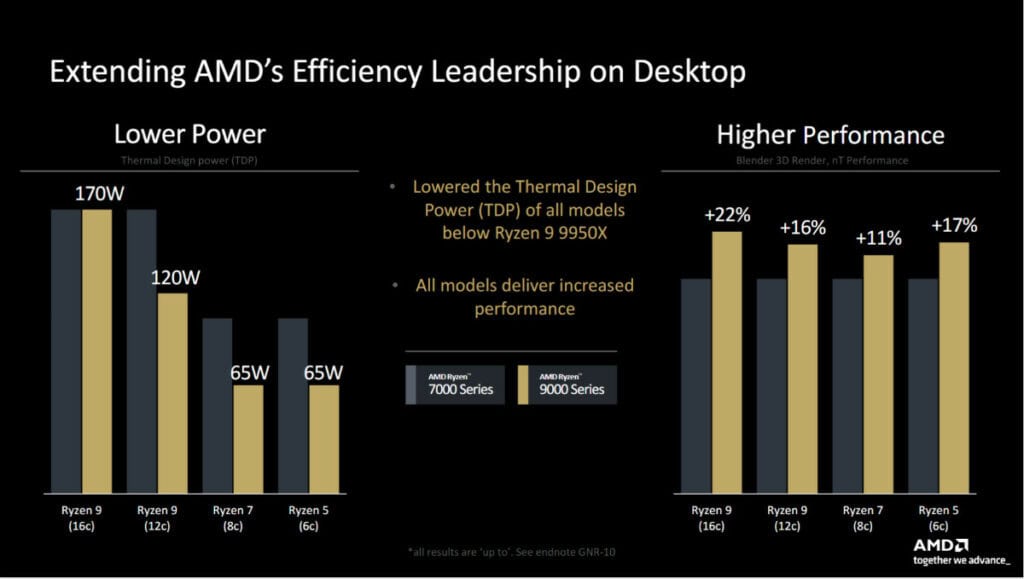
Pricing estimates
As the 9000 series has not yet been released, we don’t have all the details of the products yet. That means we don’t know the price it will be on sale for yet. But we can look back to previous releases to get an idea of what it may be so we can give you an estimate of how much it might come to.
- 7900X – $549
- 5900X – $549
That would suggest the 9900X will come out at the same price of $549. Unless AMD does a whacky move of increasing prices, or even going in the opposite direction of decreasing. Either way, it will likely come out for less than the 7950X that came out for $699 which would make the 9900X the cheaper choice.
Changes from the previous gens
| Specifications | 9900X | 7900X | 7950X | 5950X |
| Cores | 12 | 12 | 16 | 16 |
| Threads | 24 | 24 | 32 | 32 |
| L3 Cache | 64 MB | 64 MB | 64 MB | 64 MB |
| Max boost clock | 5.6 GHz | 5.6 GHz | 5.7 GHz | 4.9 GHz |
| Base clock speed | 4.4 GHz | 4.7 GHz | 4.5 GHz | 3.4 GHz |
| TDP | 120W | 170W | 170W | 105W |
| Architecture | Zen 5 | Zen 4 | Zen 4 | Zen 3 |
Above you can see the improvements of the generations and how they alter things. In general, the top CPUs keep the core and thread count the same across the generations. Along with the L3 cache that also does not change between them. We do see some movement in the clock speed in the base clock mostly across AM5, but also the TDP as the 9000 series manages to drop it further.
However, its from Zen 3 there was quite a change, the whole new platform bringing plenty of improvements. That can be seen in the clock rates, and moving to a PGA arrangement instead of LGA. But this did come at a cost of Zen 4 requiring more power at the same level. Now AMD is trying to rectify this through with Zen 5.
Along with those other things do change, like the TSMC process that is used to create these chips. Improving the general efficiency and performance depending on your use cases as well.
Alternative CPUs
If you’re after the alternatives to the 9900X or 7950X we have a selection of processors you could go for. They provide a good option if you’re either looking for an AM5 or LGA 1700 option from the competition. We also have reviews on these so you can find out their full potential.
-
AMD Ryzen 9 7950X3D
- Cores: 16
- Thread: 32
- Base Clock Speed: 100 MHz
- Boost Clock Speed: 5.7 GHz
- L3 Cache: 128 MB (shared)
- TDP: 120 W
-
AMD Ryzen 9 7900X
- Cores: 12
- Threads : 24
- Boost clock speed: 5.6 GHz
- Base clock speed: 4.7 GHz
- L3 Cache: 64 MB
- TDP: 170 W
-
Intel Core i9-14900K
- Cores: 24 (8P-16E)
- Threads: 32
- Boost clock speed : P-Core 5.8GHz / E-Core 4.4GHz
- Base clock speed: P-Core 3.2GHz / E-Core 2.4GHz
- L3 Cache: 36 MB
- TDP: 253W
-
Intel Core i9-13900K
- Cores: 24 (8P-16E)
- Threads: 32
- Boost speed : P-Core 5.8GHz / E-Core 4.3GHz
- Base speed: P-Core 3.0GHz / E-Core 2.2GHz
- L3 Cache: 36 MB
- TDP: 253 W
Which one is for you?
Now if you’re deciding between these options, there are a few considerations to help you decide. Firstly is your use case, if you’re just gaming and don’t need the extra cores, the 9900X is perfectly fine if still not overkill, as the 7950X has all the extra cores. Second is the budget, as the 950X is usually the most expensive it might take more away from your budget than you could spend on other parts like a graphics card that can boost the performance in some of your tasks.
There is also the consideration of the power and thermal budget, as the 7000 series is a bit more inefficient and requires a bit more power to run. So it might be less appealing for your next build if you have to put that extra on top. But the extra cores of the 7000 choices make it a stronger choice for those heavy-duty tasks. Here’s what the other experts in our office say, with Jack and Ussamah’s thoughts.
The Ryzen 9 9900X is behind in terms of core count, but it makes up for it in per-core performance, though it has 4 less cores, the 16% IPC increase helps it bridge the gap, and it does so with a mere 120W TDP, mush more efficient than the 7950X
The 7950X is the bulldozer of the 7000 series, it’s the CPU you call in when you need all of that power. Ideal for extreme data crunching and Simulation work tasks. It will likely be cheaper than the 9900X on launch too, so if you have a specific budget, this could be the better choice.
No matter what you choose, both CPUs belong to the AM5 platform meaning you’ll be able to take advantage of all current and future motherboards on the platform, and all of their features.
Jack Howarth
The Ryzen 9 9900X is the second most powerful processor of the 9000 series like the Ryzen 9 7950X was leading the 7000 series processors from the front. To putting these two processors against each other is very interesting.
The 9900X has the edge due to the smaller process technology while the 7950X has the lead in almost everything else. It has more cores, threads, and higher clock speeds than the 9900X. So, the question is: Would the extra hardware be enough to triumph the advantage of generational improvement the 9900X has?
I believe, we might see the 9900X outperform the 7950X by around 10% – 15% but both processors are massively powerful and have the full arsenal of next-gen features at their disposal. So, whether you have the 9900X or the 7950X, you system should be able to power through even the most demanding of tasks with a smile on its face.
Ussamah Mehmood

